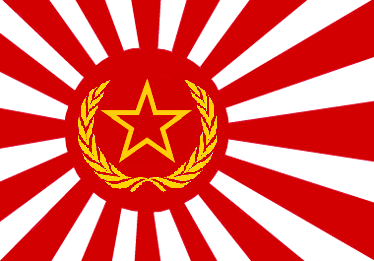The Second Japanese Empire
The collapse of the United States, and the world at large, following the "end" of the Cold War saw the Japanese people left to their own devices in an increasingly hostile and chaotic world. It seems then only natural that in the lack of any "conventional" authority and a self-sufficient economy, that communism would rise to fill the Japanese void. Communist revolutionaries would blaze the path towards a glorious new future for Japan; a second empire, a greater, more glorious empire. An Empire of the Proletariat.
The Peoples' Revolution of the Japanese Empire was spearheaded by a figure who, like so many communist leaders, emerged from relative obscurity to become a hero to a people who had been left behind by time and the world. Mirahito Isuda I would be Emperor of the Proletariat, and beforehand, Glorious Leader of the Peoples' Revolution. The impetus for the Peoples' Revolution was the decrepit and decayed state of government and society in Japan at the time of the collapse of its ally and benefactor, the United States.
While the Peoples' Revolution would not immediately follow the fragmentation of the United States, the intermediary Japanese Republic would be regarded by the revolutionaries as a despicable and detestable vehicle of the bourgeouise, who under the Republic prospered like never before at the expense of the downtrodden and oppressed proletariat. While it cannot fairly be said that the revolutionaries were not biased in their opinion of the republican regime, it can be concretely said that the Japanese Republic was powered not by a healthy and well-established economic and political engine, but by the self-serving corruption of the industrial giants who emerged from the chaos to establish the Republic to maintain their own interests.
The Japanese communist movement, while entirely of its own creation and motivation, gathered inspiration from the successes of communists in Africa. Indeed, the end of the Republic was brought about largely through the aid of African communists. Militant communist factions would become prevalent in the late 2020's and with funding from the African Communal States, communist agitator and leader Mirahito Isuda would lead his Peoples' Revolution of Japan in 2032.
The overthrow of the Republic would be followed by the creation of a "Proletarian Council" of revolutionary leaders, who would unanimously elect Mirahito Isuda to the position of Emperor of the Proletariat. With aid from the African communists, and through his own machinations, he would preside over the earliest years of the Second Empire and its proletarian state. His reign would see the creation of the Imperial Peoples' Armed Forces, and their successes over "capitalist pigdog puppet-states" in Indonesia, Korea, Taiwan and the Philippines.
The successes of the Second Empire (of the Proletariat) would see a great public confidence in the imperial regime and in the communist system. Through these means, a new and unprecedented level of stability would be brought to the Japanese people. So many years later, the Imperial Proletariat has survived and even thrived, solidifying itself as the bedrock of communism in East Asia and the Pacific. It is the position of the new Emperor of the Proletariat, however, that Japan must not rest upon its laurels. There shall be no rest until the proletariat is liberated, not only in Japan and Asia, but across the world. Onwards!





